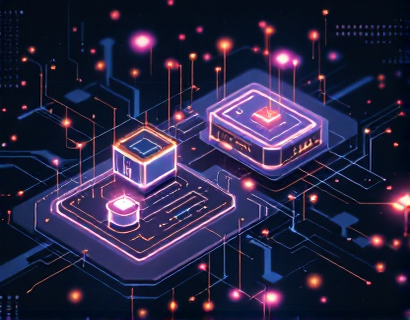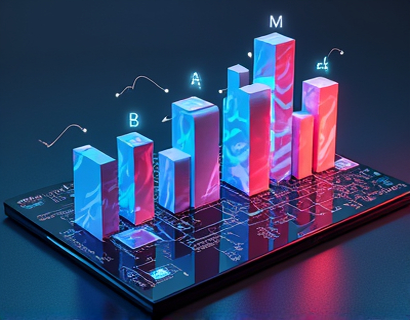Blockchain Oracle Management: Streamlining Data Integration and Smart Contract Execution for Decentralized Applications
In the rapidly evolving landscape of blockchain technology, the role of oracles emerges as a critical component for connecting decentralized applications (DApps) with external data sources. Oracles serve as bridges, providing real-time data and enabling smart contracts to interact with the off-chain world. However, managing these oracles efficiently remains a challenge for developers and businesses aiming to harness the full potential of blockchain. This article explores advanced software solutions that revolutionize oracle management, focusing on data integration and smart contract execution to ensure secure and reliable interactions in DApps.
Understanding Oracle Management in Blockchain
Oracle management in blockchain involves the process of integrating external data feeds into smart contracts. These data feeds, provided by oracles, are essential for smart contracts to make informed decisions based on real-world data. Traditional oracle solutions often suffer from issues such as data latency, security vulnerabilities, and lack of standardization. Efficient oracle management addresses these challenges by offering robust, scalable, and secure methods for data integration and smart contract interaction.
Challenges in Oracle Management
One of the primary challenges in oracle management is ensuring data accuracy and reliability. Oracles must fetch data from various sources, often across different platforms and formats, which can lead to inconsistencies. Additionally, the decentralized nature of blockchain introduces security concerns, as oracles can become potential attack vectors if not properly secured. Another significant challenge is the scalability of oracle solutions, as the number of DApps and the volume of data continue to grow exponentially.
Advanced Software Solutions for Oracle Management
To address these challenges, innovative software solutions have emerged, focusing on streamlining oracle management and enhancing the capabilities of smart contracts. These platforms offer a range of features designed to optimize data integration, improve security, and ensure seamless service access. By leveraging these advanced tools, developers and businesses can build more robust and efficient DApps.
Real-Time Data Integration
One of the key features of modern oracle management solutions is real-time data integration. These platforms utilize a network of decentralized oracles to fetch data from various sources, ensuring that smart contracts have access to the most up-to-date information. By eliminating single points of failure and reducing latency, these solutions enable DApps to respond instantly to changes in external data, enhancing user experience and operational efficiency.
For instance, a financial DApp requiring real-time cryptocurrency prices can benefit from a real-time data integration system that aggregates data from multiple exchanges and provides it to the smart contract in seconds. This level of responsiveness is crucial for applications in trading, lending, and other financial services where timely data is paramount.
Enhanced Security Measures
Security is a top priority in oracle management. Advanced software solutions implement multi-layered security protocols to protect against potential threats. These measures include decentralized validation of data, cryptographic techniques to ensure data integrity, and robust authentication mechanisms for oracles. By distributing trust across a network of oracles, these platforms minimize the risk of a single point of failure and enhance overall security.
Moreover, these solutions often incorporate automated monitoring and alert systems to detect and respond to suspicious activities in real-time. This proactive approach helps maintain the integrity of the data feed and protects the smart contracts from malicious attacks.
Scalability and Flexibility
As the blockchain ecosystem grows, oracle management solutions must scale to accommodate the increasing number of DApps and data sources. Advanced platforms are designed to handle high volumes of data and support a wide range of data types and formats. This scalability ensures that the solutions remain effective even as the demand for data-intensive DApps surges.
Flexibility is another critical aspect. These solutions provide developers with the tools to customize data feeds and integrate with various blockchain networks, including Ethereum, Binance Smart Chain, and others. This adaptability allows businesses to tailor their oracle management strategies to specific use cases and requirements, enhancing the overall value of their DApps.
Benefits of Advanced Oracle Management
The implementation of advanced oracle management solutions brings numerous benefits to developers and businesses. By streamlining data integration and enhancing smart contract execution, these platforms unlock the full potential of blockchain technology, paving the way for more innovative and reliable DApps.
Improved User Experience
With real-time data integration, DApps can offer a seamless and responsive user experience. Users can access the latest information without delays, leading to higher satisfaction and increased adoption. For example, a supply chain management DApp can provide real-time tracking data, enabling stakeholders to monitor shipments accurately and make informed decisions.
Increased Trust and Reliability
Enhanced security measures and decentralized validation processes build trust among users and developers. Knowing that data is accurate and securely transmitted fosters confidence in the DApp, encouraging more users to engage with the platform. This trust is essential for the long-term success and growth of blockchain-based applications.
Cost Efficiency
Advanced oracle management solutions often reduce operational costs by automating data fetching and validation processes. This automation minimizes the need for manual intervention and reduces the risk of errors, leading to cost savings for businesses. Additionally, the scalability of these solutions ensures that costs remain manageable as the number of DApps and data sources grows.
Case Studies and Real-World Applications
To illustrate the practical applications and benefits of advanced oracle management, consider a few real-world examples.
Financial Services
A decentralized lending platform can leverage an advanced oracle management system to access real-time interest rates from multiple financial institutions. This ensures that the smart contract always uses the most current rates, providing fair and competitive loan offers to users. The enhanced security and real-time data integration also reduce the risk of fraud and errors, enhancing the platform's reputation and user trust.
Supply Chain Management
In supply chain management, a DApp can use oracle data to track the movement of goods in real-time. By integrating with sensors and logistics providers, the platform can provide accurate and up-to-date information on the location and status of shipments. This transparency benefits all stakeholders, from manufacturers to retailers, by improving efficiency and reducing delays.
Healthcare
In the healthcare sector, a DApp can utilize oracle data to access patient records and medical research in real-time. This ensures that healthcare providers have the most current information for diagnosis and treatment, improving patient outcomes. The secure and reliable data integration also complies with stringent privacy regulations, such as HIPAA, by ensuring data is handled and transmitted securely.
Future Trends in Oracle Management
As blockchain technology continues to mature, the field of oracle management is expected to evolve further. Some key trends include the integration of machine learning for predictive data analysis, the development of cross-chain oracles for inter-blockchain data exchange, and the adoption of zero-knowledge proofs for enhanced privacy.
Machine learning can enhance data accuracy by predicting and adjusting for potential data anomalies. Cross-chain oracles will enable seamless data exchange between different blockchain networks, fostering greater interoperability. Zero-knowledge proofs will allow oracles to verify data without revealing sensitive information, addressing privacy concerns while maintaining data integrity.
Conclusion
Advanced oracle management solutions play a vital role in the success of decentralized applications by streamlining data integration and enhancing smart contract execution. By addressing the challenges of data accuracy, security, and scalability, these platforms unlock the full potential of blockchain technology. As the ecosystem continues to evolve, the importance of efficient oracle management will only grow, driving innovation and adoption across various industries.










































